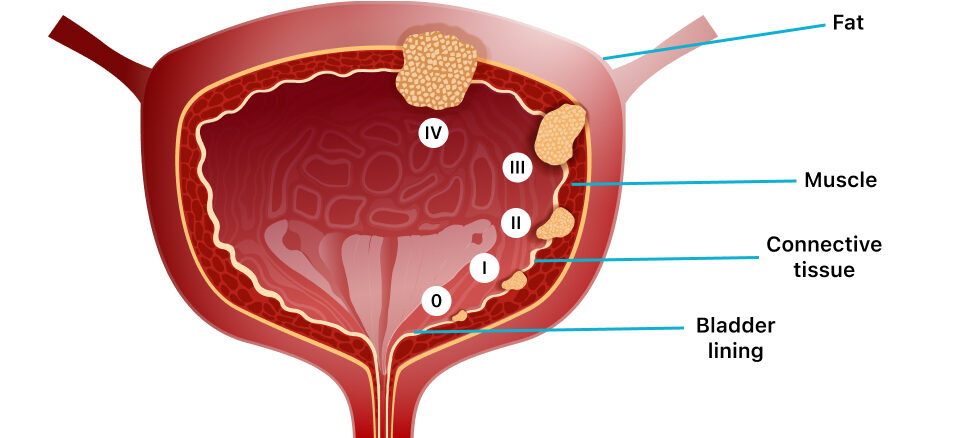Bladder tumors can significantly impact a person’s health. Recognizing the symptoms early and seeking appropriate treatments is crucial. In this blog, we will explore the signs of Bladder Tumor Symptoms and the various treatment options available.
Common Symptoms of Bladder Tumors
Early detection of bladder tumors improves treatment success. Here are the most common symptoms to watch for:
Blood in Urine
One of the first signs is often hematuria or blood in the urine. This can be visible or microscopic.
While it might not occur daily, any instance should prompt a medical consultation.
Frequent Urination
Bladder tumors can cause changes in urination patterns. This includes increased frequency, especially during nighttime. This symptom may be overlooked, but it is essential to consider it seriously.
Pain and Discomfort
Patients may experience pain during urination. Additionally, pelvic pain or discomfort in the lower back could signal a tumor. Persistent pain should never be ignored and warrants immediate medical attention.
Urinary Urgency
Feeling a sudden, intense need to urinate even when the bladder is not full is another symptom.
This urgency can be disruptive and indicate an underlying issue.
Diagnostic Methods for Bladder Tumors
Once symptoms are present, various diagnostic tools help confirm the presence of a tumor. An early and precise diagnosis is crucial for initiating timely and effective treatment.
Urinalysis
A basic test, urinalysis can detect blood or abnormal cells in the urine. It’s a common first step in diagnosing bladder issues.
Cystoscopy
This procedure involves inserting a scope into the bladder through the urethra. It allows direct visualization of the bladder interior to check for tumors.
Imaging Tests
CT scans and MRIs provide detailed images of the bladder and surrounding areas. These tests help determine the size and location of a tumor.
Biopsy
In some cases, a small tissue sample, known as a biopsy, may be taken for further examination.
A biopsy confirms whether cells are cancerous, guiding the treatment plan.
Treatment Options for Bladder Tumors
Treatment varies based on the tumor’s stage and grade. Here are the most common approaches:
Surgery
For early-stage tumors, surgery might be sufficient. Transurethral resection (TURBT) is a common procedure where tumors are removed through the urethra. In some more complex situations, a surgeon may need to perform a partial or radical cystectomy, which involves the partial or complete removal of the bladder.
Intravesical Therapy
This treatment involves placing medication directly into the bladder. It’s often used after TURBT to kill remaining cancer cells. Bacillus Calmette-Guérin (BCG) is a common intravesical therapy.
Chemotherapy
Chemotherapy is a treatment method that involves the use of medications to destroy cancer cells in various parts of the body. It’s used for more advanced bladder cancer, often in combination with surgery.
Radiation Therapy
Radiation targets cancer cells with high-energy beams. This option is sometimes combined with chemotherapy for more effective results.
Immunotherapy
Utilizing this innovative treatment method, the body’s own immune system is activated and enhanced to effectively target and combat cancer cells. New advancements in immunotherapy show promise for treating bladder tumors.
Preventing Bladder Tumors
Prevention plays a vital role in reducing bladder cancer risk. Here are some tips to consider:
Avoid Smoking
Smoking is a leading cause of bladder cancer. When you stop smoking, it can have a significant impact on reducing your risk of developing various health issues, including heart disease, lung disease, and certain types of cancer.
Stay Hydrated
Drinking plenty of fluids, especially water, helps flush toxins from the bladder. Make sure to drink a minimum of eight 8 glasses of water per day to stay properly hydrated.
Limit Exposure to Harmful Chemicals
Avoid prolonged exposure to industrial chemicals and follow safety guidelines at work. Proper protection can lower your risk of bladder tumors.
Conclusion
Recognizing bladder tumor symptoms early can lead to more effective treatments. Regular check-ups and prompt attention to unusual symptoms are crucial. If you experience any of the symptoms mentioned, seek medical advice immediately. Our gastroenterology clinic is here to provide expert care and support for all your health needs. Feel free to get in touch with us at Gastrohub Hospital if you need further information or if you’d like to arrange a specific date and time for an appointment.
Your health is our priority.


